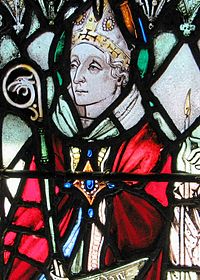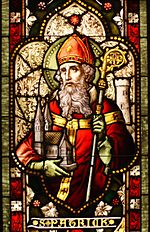- Aidan of Lindisfarne
-
For other uses, see Aidan (disambiguation).
Saint Aidan of Lindisfarne 
Aidan, Bishop of LindisfarneBishop Born Ireland Died 31 August 651
Parish Churchyard, Bamburgh, NorthumberlandHonored in Roman Catholic Church, Eastern Orthodox Church, Anglican Communion, Lutheran Church, Episcopal Church Major shrine originally Lindisfarne Abbey, Northumberland; later disputed between Iona Abbey & Glastonbury Abbey (all destroyed). Feast 31 August (Roman Catholic Church, Anglican Communion), 9 June (Lutheran Church) Attributes Monk holding a flaming torch; stag Patronage Northumbria; Firefighters -
- "Augustine was the Apostle of Kent, but Aidan was the Apostle of the English." – Bishop Lightfoot
Known as Saint Aidan of Lindisfarne, Aidan the Apostle of Northumbria (died 651), was the founder and first bishop of the monastery on the island of Lindisfarne in England. A Christian missionary, he is credited with restoring Christianity to Northumbria. Aidan is the Anglicised form of the original Old Irish Aodhán. In 2008, he was proposed as a possible patron saint of the United Kingdom.[1]
Contents
Life
An Irishman, possibly born in Connacht, Aidan was a monk at the monastery on the Island of Iona in Scotland.
The Roman Empire had spread Christianity into Britain, but due to the Anglo-Saxon invasion of Britain, Anglo-Saxon paganism was now the dominant religion. Oswald of Northumbria and his brothers lived among the Gaels of Dál Riata as princes in exile since their banishment by a rival royal house in 616 AD. Oswald may have visited the island monastery of Iona, and certainly converted to Christianity and was baptized. In 634 he regained the kingship of Northumbria, and was determined to bring Christianity to the mostly pagan people there.
Owing to his past among the Gaels, he requested missionaries from Iona, the pre-eminent monastery of the Irish in what is now Scotland, rather than the Roman-backed mission in England. At first the monastery sent a new bishop named Cormán, but he met with no success and soon returned to Iona, reporting that the Northumbrians were too stubborn to be converted. Aidan criticised Cormán's methods and was sent as a replacement in 635.[2]
Aidan chose Lindisfarne, an island like Iona and close to the royal fortress of Bamburgh, as the seat of his diocese. King Oswald, who after his years of exile had a perfect command of Irish, often had to translate for Aidan and his monks, who did not speak English at first. When Oswald died in 642, Aidan received continued support from King Oswine of Deira and the two became close friends.
An inspired missionary, Aidan would walk from one village to another, politely conversing with the people he saw and slowly interesting them in Christianity. According to legend, the king gave Aidan a horse so that he wouldn't have to walk, but Aidan gave the horse to a beggar. By patiently talking to the people on their own level Aidan and his monks slowly brought Christianity to the Northumbrian communities. Aidan also took in twelve English boys to train at the monastery, to ensure that the area's future religious leadership would be English.
In 651 a pagan army, led by Penda, attacked Bamburgh and attempted to set its walls ablaze. According to legend, Aidan prayed for the city, after which the winds turned and blew the smoke and fire toward the enemy, repulsing them; hence his patronage for fire fighters.
Aidan was a member of the Celtic branch of Christianity instead of the Latin branch, but his character and energy in missionary work won him the respect of Pope Honorius I and Felix of Dunwich.
Aidan's friend Oswine of Deira was murdered in 651. Twelve days later Aidan died, on 31 August, in the 17th year of his episcopate.[2] He had become ill while at the Bamburgh castle and died leaning against the buttress of a church on a royal estate near Bamburgh.
The monastery he founded grew and helped found churches and other monasteries throughout the area. It also became a centre of learning and a storehouse of scholarly knowledge. Saint Bede the Venerable would later write Aidan's biography and describe the miracles attributed to him. Saint Aidan's feast day is on 31 August.
See also
- St Aidan's Church, Leeds contains celebrated mosaics by Frank Brangwyn illustrating the life of Aidan.
- St. Aidan's Anglican Mission on the Eastern Shore of Maryland
- St. Aidan's Anglican, Hurstville Grove, Sydney
Notes
- ^ Home-grown holy man: Cry God for Harry, Britain and... St Aidan – This Britain, UK – The Independent
- ^ a b Powicke Handbook of British Chronology p. 237
References
- Attwater, Donald and Catherine Rachel John. The Penguin Dictionary of Saints. 3rd edition. New York: Penguin Books, 1993. ISBN 0-14-051312-4.
- Powicke, F. Maurice and E. B. Fryde Handbook of British Chronology 2nd. ed. London:Royal Historical Society 1961
Catholic Church titles New diocese Bishop of Lindisfarne
635–651Succeeded by
FinanModern titular bishops Victor Guazzelli • John Arnold
A–C Abbán · Abel of Reims · Abran · Adalgis · Adomnán · Adomnán of Coldingham · Aidan of Lindisfarne · Ailbe of Emly · Aileran · Alto of Altomünster · Andrew the Scot · Assicus · Athracht · Autbod · Baithéne · Balin · Balther · Barrfoin · Bean · Bécán · Bega · Benignus of Armagh · Beoadh · Beoc · Berach · Blaithmaic · Boadin · Boethian · Brandan · Breage · Brendan · Brendan of Birr · Briarch · Brigid of Kildare · Brogan · Bron · Brónach · Budoc · Buriana · Óengus of Tallaght · Máedóc of Ferns
Saints of Anglo-Saxon England British / Welsh / Irish Alban of St Albans · Aldatus of Oxford · Amphibalus of St Albans · Arilda of Oldbury · Barloc of Norbury · Brannoc of Braunton · Branwalator of Milton · Credan of Bodmin · Congar of Congresbury · Dachuna of Bodmin · Decuman of Watchet · Elfin of Warrington · Ivo of Ramsey · Judoc of Winchester · Juthwara of Sherbourne · Melorius of Amesbury · Nectan of Hartland · Neot of St Neots · Patrick of Glastonbury · Rumon of Tavistock · Samson of Dol · Sativola of Exeter · Urith of Chittlehampton
East Anglian Æthelberht of East Anglia · Æthelburh of Faremoutiers · Æthelflæd of Ramsey · Æthelthryth of Ely · Æthelwine of Lindsey · Athwulf of Thorney · Blitha of Martham · Botwulf of Thorney · Cissa of Crowland · Cuthbald of Peterborough · Eadmund of East Anglia · Eadnoth of Ramsey · Guthlac of Crowland · Herefrith of Thorney · Hiurmine of Blythburgh · Huna of Thorney · Pega of Peakirk · Regenhere of Northampton · Seaxburh of Ely · Tancred of Thorney · Torthred of Thorney · Tova of Thorney · Walstan of Bawburgh · Wihtburh of Ely · Wulfric of Holme
East Saxon Æthelburh of Barking · Hildelith of Barking · Osgyth · Sæbbi of London
Frisian,
Frankish
and Old SaxonBalthild of Romsey · Bertha of Kent · Felix of Dommoc · Grimbald of St Bertin · Monegunda of Watton · Odwulf of Evesham · Wulfram of Grantham
Irish and Scottish Aidan of Lindisfarne · Boisil of Melrose · Echa of Crayke · Ultan the Scribe · Indract of Glastonbury · Maildub of Malmesbury
Kentish Æbbe of Thanet · Æthelberht of Kent · Æthelburh of Kent · Æthelred of Kent · Albinus of Canterbury · Berhtwald of Canterbury · Deusdedit of Canterbury · Eadburh of Thanet · Eanswith of Folkestone · Eormengyth of Thanet · Nothhelm of Canterbury · Sigeburh of Thanet
Mercian Ælfnoth of Stowe · Ælfthryth of Crowland · Æthelberht of Bedford · Æthelmod of Leominster · Æthelred of Mercia · Æthelwine of Coln · Æthelwynn of Sodbury · Beonna of Breedon · Beorhthelm of Stafford · Coenwulf of Mercia · Cotta of Breedon · Credan of Evesham · Cyneburh of Castor · Cyneburh of Gloucester · Kenelm of Winchcombe · Cyneswith of Peterborough · Eadburh of Bicester · Eadburh of Pershore · Eadburh of Southwell · Eadgyth of Aylesbury · Eadweard of Maugersbury · Ealdgyth of Stortford · Earconwald of London · Ecgwine of Evesham · Freomund of Mercia · Frithuric of Breedon · Frithuswith of Oxford · Frithuwold of Chertsey · Hæmma of Leominster · Merefin · Mildburh of Wenlock · Mildgyth · Mildthryth of Thanet · Milred of Worcester · Oda of Canterbury · Oswald of Worcester · Osburh of Coventry · Rumwold of Buckingham · Tibba of Ryhall · Werburh of Chester · Wærstan · Wigstan of Repton · Wulfhild of Barking
Northumbrian Acca of Hexham · Æbbe "the Elder" of Coldingham · Æbbe "the Younger" of Coldingham · Ælfflæd of Whitby · Ælfwald of Northumbria · Æthelburh of Hackness · Æthelgyth of Coldingham · Æthelsige of Ripon · Æthelwold of Farne · Æthelwold of Lindisfarne · Alchhild of Middleham · Alchmund of Hexham · Alchmund of Derby · Balthere of Tyningham · Beda of Jarrow · Bega of Copeland · Benedict Biscop · Bercthun of Beverley · Billfrith of Lindisfarne · Bosa of York · Botwine of Ripon · Ceadda of Lichfield · Cedd of Lichfield · Ceolfrith of Monkwearmouth · Ceolwulf of Northumbria · Cuthbert of Durham · Dryhthelm of Melrose · Eadberht of Lindisfarne · Eadfrith of Leominster · Eadfrith of Lindisfarne · Eadwine of Northumbria · Ealdberht of Ripon · Eanmund · Eardwulf of Northumbria · Eata of Hexham · Ecgberht of Ripon · Eoda · Eosterwine of Monkwearmouth · Hilda of Whitby · Hyglac · Iwig of Wilton · John of Beverley · Osana of Howden · Osthryth of Bardney · Oswald of Northumbria · Oswine of Northumbria · Sicgred of Ripon · Sigfrith of Monkwearmouth · Tatberht of Ripon · Wihtberht of Ripon · Wilfrith of Hexham · Wilfrith II · Wilgisl of Ripon
Roman Augustine of Canterbury · Firmin of North Crawley · Birinus of Dorchester · Blaise · Florentius of Peterborough · Hadrian of Canterbury · Honorius of Canterbury · Justus of Canterbury · Laurence of Canterbury · Mellitus of Canterbury · Paulinus of York · Theodore of Canterbury
South Saxon Cuthflæd of Lyminster · Cuthmann of Steyning · Leofwynn of Bishopstone
West Saxon Æbbe of Abingdon · Ælfgar of Selwood · Ælfgifu of Exeter · Ælfgifu of Shaftesbury · Ælfheah of Canterbury · Ælfheah of Winchester · Æthelflæd of Romsey · Æthelgar of Canterbury · Æthelnoth of Canterbury · Æthelwine of Athelney · Æthelwold of Winchester · Aldhelm of Sherbourne · Benignus of Glastonbury · Beocca of Chertsey · Beorhthelm of Shaftesbury · Beornstan of Winchester · Beornwald of Bampton · Centwine of Wessex · Cuthburh of Wimborn · Cwenburh of Wimborne · Dunstan of Canterbury · Eadburh of Winchester · Eadgar of England · Eadgyth of Polesworth · Eadgyth of Wilton · Eadweard the Confessor · Eadweard the Martyr · Eadwold of Cerne · Earmund of Stoke Fleming · Edor of Chertsey · Evorhilda · Frithestan of Winchester · Hædde of Winchester · Humbert of Stokenham · Hwita of Whitchurch Canonicorum · Mærwynn of Romsey · Margaret of Dunfermline · Swithhun of Winchester · Wulfsige of Sherborne · Wulfthryth of Wilton
Unclear origin Rumbold of Mechelen
Categories:- 651 deaths
- Anglican saints
- Bishops of Lindisfarne
- Eastern Orthodox saints
- Irish Christian monks
- Medieval Gaels
- Medieval Irish saints
- Northumbrian saints
- Renewers of the church
- Wonderworkers
- 7th-century bishops
- 7th-century Christian saints
- 7th-century Irish people
- Irish expatriates in the United Kingdom
-
Wikimedia Foundation. 2010.
